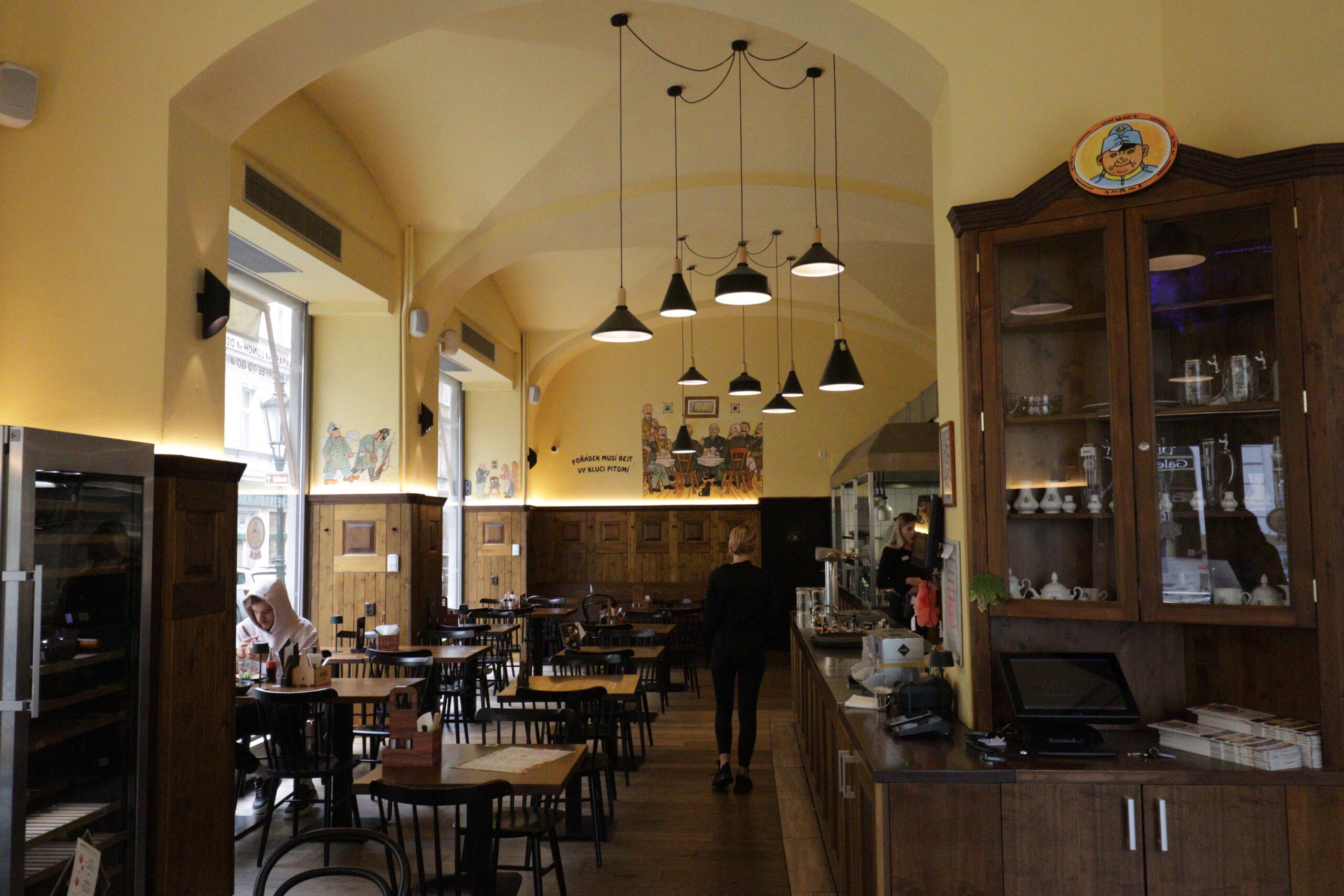There’s a certain warmth to the Švejk cafés in Prague that you can’t quite fake. You walk in and immediately feel like you’ve stepped into a storybook of Czech satire—wood-paneled walls, amber lights glowing beneath arches, and cartoonish murals retelling the misadventures of the ever-smiling, ever-naïve soldier Josef Švejk. In these photos, the atmosphere is instantly recognizable: the wry humor, the nostalgia for early 20th-century Prague, and that peculiar blend of melancholy and mischief that only Hašek’s world can conjure.
On one wall, a painted scene captures Švejk and his companions slumped over beer mugs, their faces equal parts boredom and bemusement. Above them, the famous line “Tak nám zabili Ferdinanda, paní Müllerová…” (“So they’ve killed Ferdinand, Mrs. Müllerová…”) greets you like an opening sentence of a novel that changed Czech literature forever. It’s both absurd and oddly comforting—a perfect summary of how Czechs have historically met tragedy with irony. The mural’s rustic colors—muted browns, greens, and beiges—blend beautifully with the café’s soft yellow tones and the dark wood furniture, all glowing gently under the warm pendant lights.

In the second image, you can see how the entire space carries that same mood—a long, vaulted interior where every corner feels like part of a larger comic strip. Wooden tables, bentwood chairs, and a quiet figure sitting alone in a hoodie, perhaps unaware that the scene mirrors one of Švejk’s own moments of waiting and wondering. The light coming through the windows spills across the floorboards, highlighting the balance between everyday modernity and this playful, nostalgic décor. Even the display cabinet filled with teapots, mugs, and beer steins feels like it belongs to a bygone Prague—one where stories, politics, and laughter mingled over pints of Pilsner.

The Švejk-themed restaurants are more than tourist curiosities; they’re cultural shrines of irony. Named after Jaroslav Hašek’s The Good Soldier Švejk—a satirical novel published in the aftermath of World War I—they serve as both pubs and time capsules. The novel’s antihero, Švejk, embodies Czech resilience: he’s absurdly obedient, hilariously literal-minded, and yet somehow undermines every authority figure through his sheer naïveté. The cafés channel that same energy—mocking bureaucracy, celebrating beer, and finding humor in futility.
In Prague, visiting one of these places is less about the food (though the goulash and dumplings are reliably hearty) and more about immersing yourself in a mood. You’re not just dining—you’re entering the story. The laughter painted on the walls is contagious, the waiters wear expressions of practiced irony, and you can almost imagine the ghost of Hašek himself, chuckling in a corner over a half-drunk glass of lager.
Some travelers stumble upon these restaurants by accident, thinking they’re simply cozy Czech pubs. But locals know they represent something deeper—an affectionate satire of their own national temperament. The humor is self-aware, unpretentious, and timeless. Švejk’s spirit still lingers in the laughter that rises over clinking glasses, in the whimsical art on the walls, and even in the resigned shrug of the man at the next table, waiting for his soup to arrive.
It’s this blend of humor and history that makes the Švejk cafés so distinctively Prague. They invite you to sit down, take a sip, and—just for a while—join the great cosmic joke that Švejk himself never stopped telling.
Leave a Reply